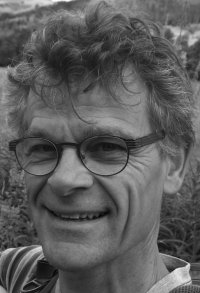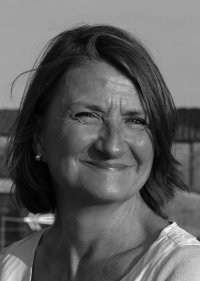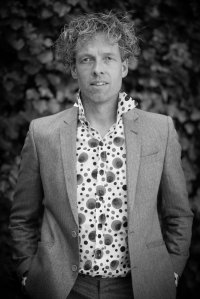illustration Henk van Ruitenbeek
Gert-Jan Ho
fstede, professor of Applied Information Technology

‘I thought what Ridley said made sense. He is a rational man who presents optimistic statistics and says: a lot can still be done.
I’ve read his The Evolution of Everything, a great book. In it he explains the idea of path-dependence: things happen, and then other things happen, at random. Human beings cannot handle that; they want to ascribe events to a God or a director. If you are a nit-picker, you can easily pick holes in his lecture, because it wasn’t watertight, but I am noticing something else among scientists; a feeling of “Hey, you’re on our patch”. They don’t like that. I am optimistic about the achievements of science, but not so much about the way it is being conducted. People are cramping each other’s style. Disciplines are like fenced-off gardens in a new neighbourhood. Great that Louise Fresco is trying to open it up.’
Svenja van Vug
t, MSc student of International Development Studies

‘I think Ridley does a bit of cherry picking. That makes you tend towards being really convinced by his optimism, but I am sceptical about his conclusions. There are a lot of things going wrong in the world too. Ridley skates over that by spouting lots of facts, and I don’t know if they are correct. Personally, I am optimistic about science. But science alone won’t get us there. The world of politics and the world of science have got to come together.’
Pieter Zuidema, personal professor of Tropical Forests

‘In itself, I do share Ridley’s optimism, even though I am an ecologist who studies tropical forests. And if there is one thing you could be justified in being pessimistic about, it is the future of tropical forests. And yet I am optimistic that science will come up with solutions on many fronts. But science plays several roles. You ought to use knowledge to warn people too. I definitely don’t share Ridley’s optimism about the environment. The predictions about the impact of climate change point in a very different direction to what he shows us. He presents a pretty selective set of scientific results. The scientific consensus in many fields is very different to what he suggests.’
Bettina Bock, teacher of Rural Sociology

‘Students of Development Studies frequently feel frustrated when, yet again, there is criticism of development projects and teachers say: it is complex and tricky. The students want to achieve something. I’m with them there. I want to contribute to a better world with my scientific work. I think most of the people at WUR feel that way. We hope we can contribute something, but we don’t have a naïve faith in progress, and we do keep a careful, critical eye on what is going on. We have to find out what the intended and the unintended effects of our actions are. But in the end, I think we have enough commitment and optimism to contribute to the university’s mission. That is the strength of this institution.’
Martin Scholten, director of the Animal Sciences Group

‘I am an optimist. I can relate to a number of things Ridley talks about. I too was trained as an ecologist in the 1970s, when a dogmatic doom and gloom scenario prevailed. I recognize the examples he gives. I agree that we can feed the world with the biomass we grow. And we will certainly do that even better in future. But Ridley does get carried away. On the subject of the impact of climate change, he goes too far and his examples are far-fetched. Then he becomes just as dogmatic as the doomsayers. It’s nice to have a speaker like him to balance out the discussion, but I don’t follow his optimism blindly. Nevertheless, it is inspiring in the sense that not everything in the world is getting worse.’
Robert Kamphuis, artist

‘I like it when someone looks at things from a different angle. And that it’s done with an optimistic attitude.
As an artist, I try to ask myself every day whether there is another way to go about things. Of course I am curious to know how accurate Ridley’s data and claims are, and I hope Wageningen scientists will check them. I think it’s good that we get to hear this different perspective in Wageningen. I’m quite proud of that actually. Generally I see WUR as a very traditional university. I get the feeling we’re in second gear, while the world around us got into fifth gear long ago. Internal communication is poor, I feel, and I think most of us have very little idea about the new ideas and insights being discovered at WUR. I would like to see a creative motor on campus. A building or place where ideas are exchanged and where people demonstrate new ways of doing things. And as far as I’m concerned, people like Ridley could be invited more often.’
Patrick Jansen, professor of Resource Ecology

‘There was a lack of neutrality in Ridley’s address. I saw examples of lying with statistics. Expressing problems such as hunger, poverty and natural resource consumption in percentages instead of absolute figures creates a falsely positive impression. Stressing that the global forest cover is constant covers up the problem that the old tropical forests, where most of the biodiversity is found, are still being destroyed on a large scale. The wolf is doing well because we are doing well. But that wellbeing is based on the import of natural resources from less developed countries, which is one of the reasons large predators there are not doing well. So I am uneasy about this eco-modernism. I am open to discussion but I get cross if you only mention the positive points. Because when I look at biodiversity, I see no grounds for optimism.’
